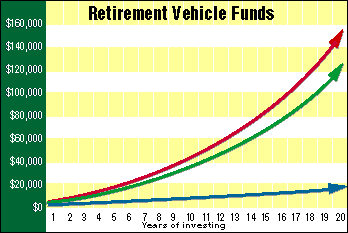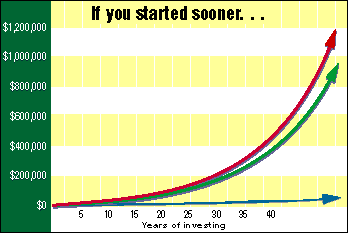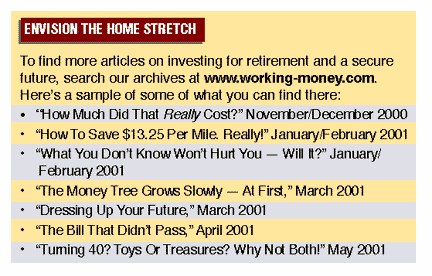
HOT TOPICS LIST
- Strategies
- Stocks
- Buy
- Investing
- Brokers
- Psychology
- Interviews
- Accumulate
- Sell
- Hold
- Spotlight
- Websites
- Candlestick Corner
- Gold & Metals
- Options Trading
LIST OF TOPICS
MONEY MANAGEMENT
How Much Are Your Habits Costing You?
05/30/01 03:05:54 PM PSTby Bruce R. Faber
What will you drive down memory lane?
| French political leader Charles De Gaulle once declared, "Growing old is no more than a bad habit, which a busy man has no time to form." Who wouldn't like to think that avoiding old age is simply a matter of keeping busy? But the fact remains: The human body deteriorates with age. Growing old may be an inescapable "habit," but there are other destructive habits that can be broken. In the words of my longtime friend Melvin Montgomery, "If I had known I was going to live this long, I would have taken a lot better care of myself!" When I was building and driving racecars with Mel back in the 1960s, we never imagined he would end up with an oxygen canister in the back of his wheelchair. His body, grimacing in pain and gasping to draw breath from that canister, bears little resemblance to the lanky, chain-smoking live wire I knew 35 years ago. MAKING BETTER DECISIONS Now, it's too late -- way too late -- to go back and make better decisions that would translate into good health and financial freedom for Mel today. Unfortunately, the same is true for many people, both physically and financially. Just because the future seems distant in the days of youth doesn't mean you won't eventually get there. Bad physical and financial decisions made in the days of yore usually end up putting a hell of a tarnish on your golden years -- a tarnish that leaves them not golden at all. True, miracles are possible; maybe you'll win the PowerBall lottery. Don't bet your life on it, though. Chances are excellent that if you don't show some respect for your future -- while you still can -- your future won't show much respect for you, either. Even at the relatively cheap prices of yesteryear, if the money my racing buddy spent every week for 14 packs of cigarettes, a case of beer, and a bottle of Scotch went into a savings account instead of Kool, Coors, and Vat 69, he could today be attending the Monaco Grand Prix instead of loading his wheelchair into a van for a ride to the clinic. But for now, let's forget about the physical side of the equation. Let's even forget about what my buddy could have done, because he didn't. You still can. You can make better decisions. You can enjoy a more comfortable set of "wheels" in your retirement years. Today, my friend's vices would cost about $57 per week. The math is pretty easy. Conservatively, about $35 for the cigarettes, $12 each for the case of beer and bottle of Scotch. But for the sake of argument, and to prove my point, let's say you can get your fix cheaper; your vices only cost $50 per week.
FIGURE 1: The top (red) line represents what could be saved once an inflation-adjusted IRA contribution limit gets through Congress. The lower (green and blue) lines combined represent what is currently available. So now you have an extra $50 per week for 52 weeks, which you can put toward a better retirement vehicle. With that $2,600 every year you will have enough to buy a $500 certificate of deposit (CD) and fully fund a $2,000 individual retirement account (IRA). Or, if Congress has finally allowed us to save at the fair inflation-adjusted rate, you can fund half of a $5,000 Ira. How much you end up with all depends, of course, on when you decide to begin investing in your improved set of golden wheels. Regardless of when you change your habits, the difference will be substantial. Even if you only switch from vice to virtue 20 years before retirement and never get an inflation-adjusted IRA, there still could be an extra $114,550 to enhance your travel plans, just in the IRS alone. That $500 CD you bought every year should add about $15,000 after taxes, give or take. (See Figure 1.) Toward the other end of the scale, if the inflation-adjusted Ira bill becomes law and you start socking away the full $2,500 for 40 years or more, there should be well over $1 million waiting to rev your engines. (See Figure 2.)
FIGURE 2: The power of time: By doubling the time factor, the accumulated money jumps many times over!
These numbers are based on a traditional IRA making the average 10% return I have been advocating since day one. (See sidebar "Envision the homestretch" for a list of previous articles, including my article on what is and is not realistic in long-term returns.) With these kinds of results, you really should think twice next time you are confronted by a vice, not just for your physical health, but also for your financial health. Bruce Faber can be reached at BFaber@Traders.com. Current and past articles from Working Money, The Investors' Magazine, can be found at Working-Money.com.
Copyright © 2001 Technical Analysis, Inc. All rights reserved. |
| Title: | Staff Writer |
| Company: | Technical Analysis, Inc. |
| Address: | 4757 California Ave. SW |
| Seattle, WA 98116 | |
| Phone # for sales: | 206 938 0570 |
| Fax: | 206 938 1307 |
| Website: | traders.com |
| E-mail address: | BFaber@traders.com |
Traders' Resource Links | |
| Charting the Stock Market: The Wyckoff Method -- Books | |
| Working-Money.com -- Online Trading Services | |
| Traders.com Advantage -- Online Trading Services | |
| Technical Analysis of Stocks & Commodities -- Publications and Newsletters | |
| Working Money, at Working-Money.com -- Publications and Newsletters | |
| Traders.com Advantage -- Publications and Newsletters | |
| Professional Traders Starter Kit -- Software | |
PRINT THIS ARTICLE

Request Information From Our Sponsors
- StockCharts.com, Inc.
- Candle Patterns
- Candlestick Charting Explained
- Intermarket Technical Analysis
- John Murphy on Chart Analysis
- John Murphy's Chart Pattern Recognition
- John Murphy's Market Message
- MurphyExplainsMarketAnalysis-Intermarket Analysis
- MurphyExplainsMarketAnalysis-Visual Analysis
- StockCharts.com
- Technical Analysis of the Financial Markets
- The Visual Investor
- VectorVest, Inc.
- Executive Premier Workshop
- One-Day Options Course
- OptionsPro
- Retirement Income Workshop
- Sure-Fire Trading Systems (VectorVest, Inc.)
- Trading as a Business Workshop
- VectorVest 7 EOD
- VectorVest 7 RealTime/IntraDay
- VectorVest AutoTester
- VectorVest Educational Services
- VectorVest OnLine
- VectorVest Options Analyzer
- VectorVest ProGraphics v6.0
- VectorVest ProTrader 7
- VectorVest RealTime Derby Tool
- VectorVest Simulator
- VectorVest Variator
- VectorVest Watchdog



